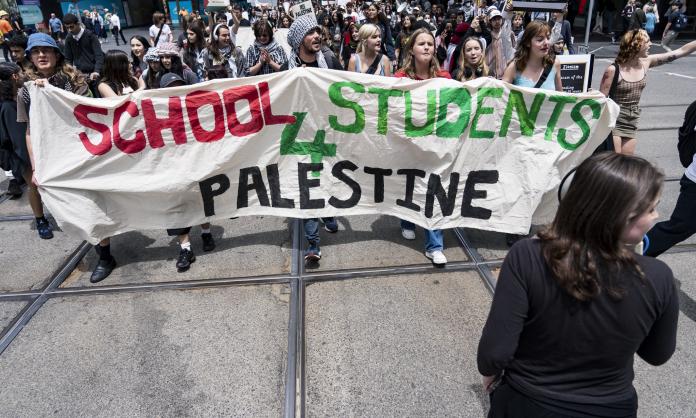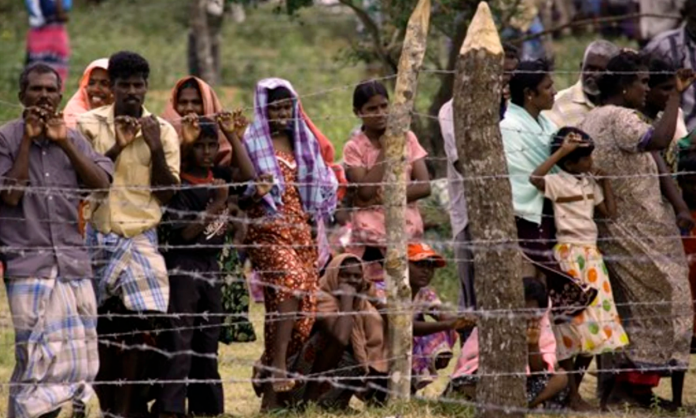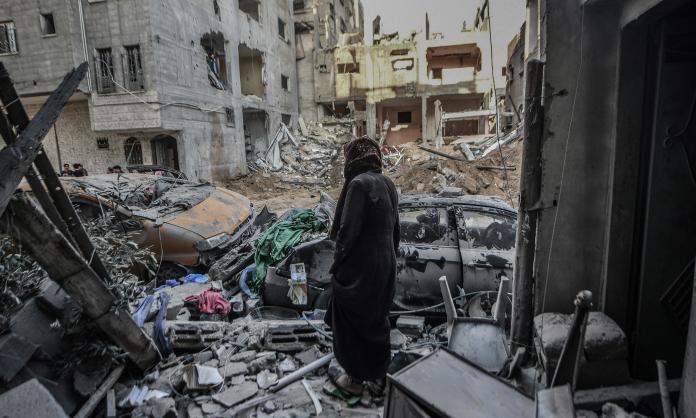Mainstream politicians and pundits have long peddled the narrative that young people are politically disengaged, more interested in taking selfies than changing society. But the explosion of youth-led climate protests and Palestine activism indicates there is no shortage of political opinions among young people. They’re just not the sort of opinions the establishment approves of.
When more than 2,000 high schoolers walked out of school last week to take a stand against Israel’s genocide in Gaza, politicians across the aisle mocked, condemned and patronised them. ABC’s 7.30 Report ran a story with a contemptible contention: high schoolers, far from having the collective courage to raise their voices for justice in Palestine, had likely faced indoctrination from biased social media platforms.
When thousands of high schoolers swarmed the streets demanding urgent action on climate change at the height of the Schools Strike 4 Climate movement in 2018 and 2019, they were met with a smear campaign from the government. Dan Tehan, then federal minister for education, told the Daily Telegraph that “taxpayer funded eco-worriers” were masterminding “an appalling political manipulation” of high schoolers. Resources Minister Matt Canavan told ABC that the only thing high-school protesters learnt was “how to join the dole queue”; only school could teach them things that matter: “how to build a mine, how you do geology, how you drill for oil and gas”.
When hundreds of brave high schoolers rallied at Flinders Street Station in 2007 to protest against the figurehead of US imperialism, George Bush, Labor Prime Minister Kevin Rudd had stern words for these disobedient teens. “Stick to [your books]”, he urged. “This is not a time for kids to get mixed up in protest activity.” Rudd clearly hadn’t heard the catchcry of earlier generations of anti-war student protesters and their pithy riposte to establishment politicians: books, not bombs—or, in the slightly expanded form that gained traction during 2003 school walkouts against America’s invasion of Iraq, “when the bombs drop, school stops”.
Time and time again, when young people mobilise against the rich and powerful and the war-mongering, climate-destroying status quo, they’re deemed too dumb to understand, too impressionable to have agency and too impotent to make change. In part, this reflects the way that political and economic leaders respond to anyone who challenges their prerogatives. But it also reflects something more specific: in an era of deep crisis and declining support for traditional political forces, young people are a constant thorn in the side of those who want to claim social consensus exists around conservative politics.
Much to the chagrin of the political right and the corporate media, young people’s political views are well to the left of other social layers on every major issue. ABC’s 2022 Vote Compass, a representative survey conducted and published after every Australian federal election since the 1980s, revealed that young people were the most left-wing in the poll’s history.
The Australian Election Study found that support for the Coalition among people younger than 40 was as low as 25 percent in 2022, which is the lowest support for either major party in such a large cohort in the study’s history. Young people also vote Green at the highest rate of any age group—in 2019 the Australian Election Study found a record 37 percent of 18 to 25-year-olds gave their primary vote to the Greens.
Concern about the climate is an important factor driving this trend. In the last Vote Compass, young people nominated climate change as the main issue that matters to them. Other surveys reflect the same sentiment. For example, the 2020 Our World, Our Say report, led by the Australian Institute for Disaster Resilience and World Vision, found that 80 percent of participants between 16 and 24 years old were extremely concerned about climate change and government inaction.
And climate change is not the only thing young people are concerned about. Younger people were also most likely to support the Voice to Parliament, according to polling by the Australia Institute in July this year. Seventy-three percent of 18 to 29-year-olds indicated they would vote yes, compared to 52 percent over all. Support for this extremely moderate reform, which became the basis of a racist campaign by the far right and Liberal Party, decreased in direct proportion to age.
When consulted on cost-of-living pressures, young people consistently demand greater government assistance to ensure basic needs are met. The third annual Australia Youth Barometer, published earlier this month by Monash University, found that 70 percent of young people think affordable housing is an issue requiring immediate action from the government—9 percent more than in 2022.
These views reflect the grim social reality that most young people face. Increasingly frequent and severe climate catastrophes, entrenched social inequality and mounting financial stress mean it’s not hard to understand why young people express demands and sentiments that put them at odds with the status quo.
As 21-year-old Frewoini Baume told ABC News, “Our generation has been raised into this world where it’s like, everything is record breaking, unprecedented”. And short of a social transformation that matches the scale of crisis, the outlook for young people feels bleak. In the recently released Scanlon Foundation report on social cohesion, 43 percent of young respondents said they are pessimistic about the future—more than any other age bracket.
Far from representing some kind of generational weakness, as some prominent Australian business people have suggested, young people’s heightened pessimism also reflects something real: that they tend to bear the brunt of economic and social precarity, more than any other age group.
According to a recent report from CommbankIQ based on financial data from 7 million Australian residents, young people have suffered the greatest deterioration in their economic and social conditions as a result of the cost-of-living crisis. The report reveals that, while people under 30 are slashing their spending on food, fuel and insurance to stay afloat, those over 65 are instead expanding their discretionary spending faster than inflation. Fewer savings and assets, lower wages and myriad government policies that benefit older, wealthy voters are all compounding to create an untenable situation for young people.
Young people don’t need to be convinced that the system isn’t working; the struggle to get by under capitalism helps do that by itself. The challenge is to channel that sentiment into collective campaigns, protests and movements that can start to take on the powers that be and give a lead to others to do the same. As the world’s most famous young rebel, Greta Thunberg, put it, “We can no longer save the world by playing by the rules because the rules have to be changed”.
PHOTO CREDIT: Matt Hrkac







